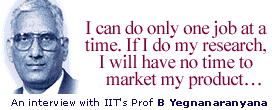

|
|
|
|
| HOME | INFOTECH | HEADLINES | |||
|
August 25, 1999
HEADLINES
|
 Professor B Yegnanaranyana heads the Department of Computer Science and Engineering at the Indian Institute of Technology-Madras.
Professor B Yegnanaranyana heads the Department of Computer Science and Engineering at the Indian Institute of Technology-Madras.
When the Speech and Vision Laboratory was set up in your department in the early Eighties what was your aim? We had a goal, which may not be reachable, but that goal is speech translation of one Indian language into another. For example, we want to create a situation when you can just a lift a telephone and talk to any person on the other side in your own language without even bothering about the language in which the other person is talking. And, the other person can respond in his own language too. A kind of unification of India? I don't like to use that word. That is one word the politicians use. I am only a scientist. Our main goal is to create a phonetic engine. Once you develop the phonetic engine, it will be universal for all Indian languages. Our research activities are on speech signal processing, speech-to-text conversation, text-to-speech conversation, speaker recognition, speech enhancement and applications of neural networks, image processing and biometrics. Many companies have come out with speech software. How different is your software going to be from what we have in the market today? There will be some similarities and quite a few differences because whatever we have developed has been developed here originally. The very fact that our papers are published in the international journals shows that they are original. This may be complementary to the ideas that are developed elsewhere. Many people around the world are working on speech software. But for example, if we develop a good phonetic engine it can have a worldwide impact. The thrust of our activity is on the development of natural input and output interfaces to a computer through speech and image. Secondly, we want to develop person authentication systems for providing secure access to information using biometrics that involves inputs in the form of speech, video, fingerprints, etc. We are also addressing issues related to content based information storage and retrieval. But the most important and the long-term objective of the group is to develop a system for automatic speech translation from one language to another. And our focus is on the development of speech-to-text and text-to-speech system for Indian languages. We have already developed an unrestricted text-to-speech system for Hindi and five other Indian languages. We are also into developing a speech-to-text system for Indian languages using syllable-like units as basic sound units. A lot of research has been going on around the world. As far as the research at the IIT-Madras is concerned, where do you stand? I think we are as good as anybody else. When I say, as good as anybody else, what I mean is we are one among the top 20 or 15 in the world. Earlier you said that you do not want to sell your software as a product in the market. Then, who will benefit from your research work? As an academician, I can do only one job at a time. If I do my research, I will have no time to market my product and if I concentrate on that, my research will suffer. You cannot be an expert teacher, expert scientist, expert researcher, and expert industry consultant at the same time. But if you develop something that will be beneficial to the people, why don't you see that it reaches the people? The WLL technology developed by your colleague Professor Jhunjhunwala is being used in many places in India and he has even sold the technology to many countries. Whatever we have created is available to anyone. If you want it, you can have it free. See you have to understand the priorities one sets. I have my own priorities. I agree it should be available to the common man but I can do it only at a price and that is my research work. As an academic man, I feel I have a different role to play. |
||||||
|
HOME |
NEWS |
BUSINESS |
SPORTS |
MOVIES |
CHAT |
INFOTECH |
TRAVEL |
SINGLES BOOK SHOP | MUSIC SHOP | GIFT SHOP | HOTEL RESERVATIONS | WORLD CUP 99 EDUCATION | PERSONAL HOMEPAGES | FREE EMAIL | FEEDBACK |